Software Development, Finance and AI
We’ve been doing Software Development and Architecture work for a while at Snowpal, and currently have several B2B and B2C products in production. In this podcast, we’ll share our experiences on a regular basis to help you & your teams build great software. The topics covered in this podcast will include Product Management, Project Management, Architecture, Development, Deployment, Security, Release Management, Sales, Marketing, Advertising, and just about everything else an ambitious, fast growing startup based out of the US is likely to be involved in. So, join us. Let’s become better!
We’ve been doing Software Development and Architecture work for a while at Snowpal, and currently have several B2B and B2C products in production. In this podcast, we’ll share our experiences on a regular basis to help you & your teams build great software. The topics covered in this podcast will include Product Management, Project Management, Architecture, Development, Deployment, Security, Release Management, Sales, Marketing, Advertising, and just about everything else an ambitious, fast growing startup based out of the US is likely to be involved in. So, join us. Let’s become better!
Episodes
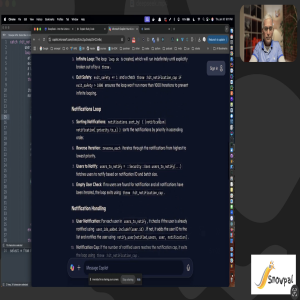
Tuesday Mar 18, 2025
Exploring Ruby Code with AI Tools: DeepSeek, ChatGPT, CoPilot, Gemini
Tuesday Mar 18, 2025
Tuesday Mar 18, 2025
In this podcast, Krish Palaniappan explores a piece of Ruby code used for a notification system, analyzing it through the lens of four different AI tools: DeepSeek, ChatGPT, Microsoft Copilot, and Gemini. The discussion delves into the strengths and weaknesses of the code, the evolving role of AI in software development, and the insights provided by each tool during the review process. The conversation highlights the importance of code readability, efficiency, and the potential for automation in code reviews. In this conversation, Krish Palaniappan discusses various AI tools for code review, comparing their functionalities, user interfaces, and performance. He emphasizes the importance of readability and modularization in code, while also sharing insights on the growing relevance of Python in AI development. The conversation culminates in a ranking of the tools based on their effectiveness, with ChatGPT emerging as the preferred choice.
Snowpal Products
Backends as Services on AWS Marketplace
Mobile Apps on App Store and Play Store
Web App
Education Platform for Learners and Course Creators
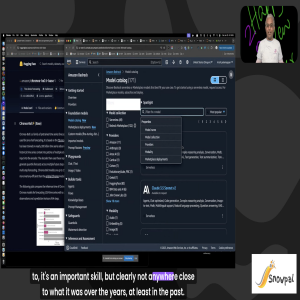
Tuesday Mar 18, 2025
AI Explorer Series (Part 3: Anthropic, Hugging Face, Cohere)
Tuesday Mar 18, 2025
Tuesday Mar 18, 2025
In this conversation, Krish Palaniappan delves into the AWS AI series, focusing on Amazon Bedrock and its foundational models. He discusses the differences between serverless models and the Bedrock marketplace, the importance of selecting the right model for specific use cases, and the training and inference processes in AI. The conversation also compares AWS Bedrock with Azure's offerings and emphasizes the complexities of AI architecture in modern development. In this conversation, Krish Palaniappan delves into the complexities of selecting AI models and platforms, particularly focusing on Bedrock and Hugging Face. He discusses the challenges startups face in asset comparisons, the importance of initial architecture in software development, and the evolving landscape of AI tools. The conversation emphasizes the need for a strategic approach to model selection, deployment, and understanding pricing structures, while also highlighting the significance of community engagement in the AI space.
Snowpal Products
Backends as Services on AWS Marketplace
Mobile Apps on App Store and Play Store
Web App
Education Platform for Learners and Course Creators
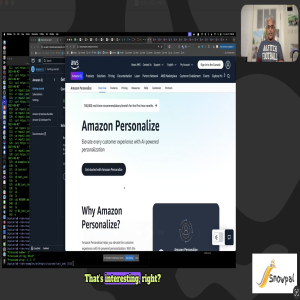
Tuesday Mar 18, 2025
AI Explorer Series (Part 2: AWI AI Products)
Tuesday Mar 18, 2025
Tuesday Mar 18, 2025
In this conversation, Krish Palaniappan explores various AWS AI products, providing an overview of their functionalities and applications. The discussion covers medical AI solutions, intelligent search capabilities, conversational AI, anomaly detection, healthcare data management, customer experience personalization, voice and image recognition technologies, machine translation, and deep learning frameworks. The conversation emphasizes the competitive landscape of AWS in the AI domain and concludes with reflections on the explored products.
Snowpal Products
Backends as Services on AWS Marketplace
Mobile Apps on App Store and Play Store
Web App
Education Platform for Learners and Course Creators
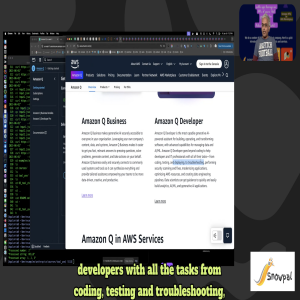
Tuesday Mar 18, 2025
AI Explorer Series (Part 1: AWI AI Products)
Tuesday Mar 18, 2025
Tuesday Mar 18, 2025
In this conversation, Krish Palaniappan explores various AWS AI products and services, discussing their applications, features, and potential use cases. He emphasizes the importance of understanding these tools at a foundational level, especially for beginners in the AI space. The discussion covers specific AWS offerings like Amazon Q, SageMaker, and App Studio, as well as the significance of human review in machine learning through Augmented AI. The conversation aims to provide insights into navigating the complex landscape of AWS AI tools and their integration into business processes.
Snowpal Products
Backends as Services on AWS Marketplace
Mobile Apps on App Store and Play Store
Web App
Education Platform for Learners and Course Creators
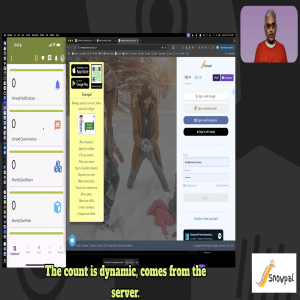
Tuesday Mar 18, 2025
Building a Mobile App: Part 2 (Components, Local Storage)
Tuesday Mar 18, 2025
Tuesday Mar 18, 2025
In this course, Krish Palaniappan delves into the intricacies of mobile app development, focusing on local storage, UI components, and the design principles that guide effective app creation. He emphasizes the importance of iterative development and minimal viable products while comparing his app, Snowpals, with the Panera Bread app to illustrate key concepts. The discussion also covers the distinction between functional and presentational components, providing insights into best practices for building reusable and efficient app components. In this conversation, Krish Palaniappan discusses the importance of reusable UI elements and functional components in mobile app development. He emphasizes the need for a clear separation between presentation and functional components, focusing on practical implementation over theoretical concepts. The discussion transitions into local storage strategies, highlighting the significance of efficient data management and caching to enhance user experience. The conversation concludes with a recap of the key points covered, reinforcing the importance of thoughtful design and architecture in mobile applications.
Snowpal Products
Backends as Services on AWS Marketplace
Mobile Apps on App Store and Play Store
Web App
Education Platform for Learners and Course Creators
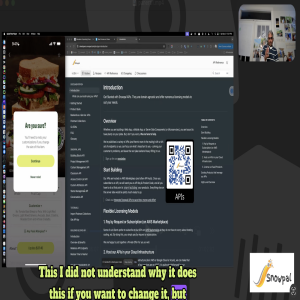
Tuesday Mar 18, 2025
Building a Mobile App: Part 1 (UI/UX Review)
Tuesday Mar 18, 2025
Tuesday Mar 18, 2025
In this conversation, Krish Palaniappan reviews the Panera Bread mobile app, focusing on its user interface, experience, and functionality. He discusses the importance of user loyalty and how it affects app usage. Throughout the review, he identifies various bugs, issues with the app's workflow, and areas for improvement, particularly in terms of speed and user interaction. The conversation highlights the significance of a well-designed app in enhancing customer satisfaction and loyalty. In this conversation, Krish Palaniappan reviews the Panera app, discussing various aspects such as coffee subscriptions, user experience challenges, customization features, rewards and offers, and overall app navigation. He highlights the importance of user interface design and the need for improvements in speed and personalization. The conversation culminates in a reflection on the app's usability and the feedback process.
Snowpal Products
Backends as Services on AWS Marketplace
Mobile Apps on App Store and Play Store
Web App
Education Platform for Learners and Course Creators

Tuesday Mar 18, 2025
Community Driven Product Development (feat. Jake McKee)
Tuesday Mar 18, 2025
Tuesday Mar 18, 2025
In this episode, Krish Palaniappan interviews Jake McKee, a consultant specializing in community-driven product development. They discuss the importance of integrating customer voices into the product development process, the three stages of product development, and how community involvement can lead to better products and customer loyalty. Jake shares insights on when to involve the community, how to find the right voices, and the significance of timing in community engagement. A case study on LEGO Mindstorms illustrates the practical application of these concepts. In this conversation, Jake McKee discusses the critical aspects of community-driven product development, emphasizing the importance of defining clear outcomes, engaging the right people, and utilizing effective tools for feedback. He explores the evolving nature of participant roles throughout the development process and the significance of maintaining engagement and expertise. The discussion also touches on the role of AI in facilitating these processes, highlighting both the potential benefits and challenges of integrating technology into community engagement. In this conversation, Krish Palaniappan and Jake McKee explore the intersection of creativity and technology, emphasizing the importance of integrating the arts into STEM education. They discuss cultural perspectives on career choices, the role of creativity in a tech-driven world, and the need for interdisciplinary skills. The conversation also touches on the future of work, the significance of problem-solving skills, and the importance of teaching creative problem-solving to future generations. Finally, they highlight Austin as a unique cultural hub that fosters community and creativity.
Snowpal Products
Backends as Services on AWS Marketplace
Mobile Apps on App Store and Play Store
Web App
Education Platform for Learners and Course Creators
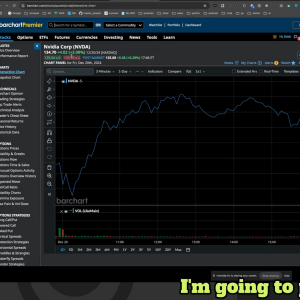
Tuesday Mar 18, 2025
ST 108: Day Trading Stocks - Part 3
Tuesday Mar 18, 2025
Tuesday Mar 18, 2025
In this conversation, Krish Palaniappan discusses trading activities observed in the market, focusing on three key securities: Palantir, Tesla, and Meta. He explains the significance of a triple witching day, analyzes the daily performance of these stocks, and highlights the volatility during the first hour and last 30 minutes of trading. The discussion also covers fluctuations in stock prices and trading volumes, providing insights for day traders and investors. In this conversation, Krish Palaniappan delves into the intricacies of trading volume and its implications for day trading. He discusses various trading tools, analyzes the trading volumes of major stocks like Palantir, Tesla, and Meta, and highlights the significance of understanding trading patterns. The conversation emphasizes the importance of being informed about market dynamics and the challenges of day trading, while also encouraging listeners to explore further educational resources.
Prerequisites
This is a follow up to the 2 courses below.
https://products.snowpal.com/p/day-trading-stocks-part-1?utm_source=publication-search
https://products.snowpal.com/p/day-trading-stocks-part-2?utm_source=publication-search
Snowpal Products
Backends as Services on AWS Marketplace
Mobile Apps on App Store and Play Store
Web App
Education Platform for Learners and Course Creators
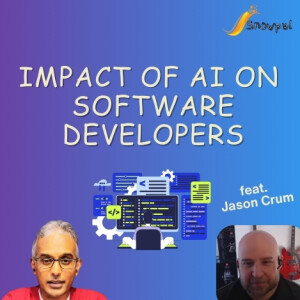
Tuesday Mar 18, 2025
Impact of AI on Software Developers (feat. Jason Crum)
Tuesday Mar 18, 2025
Tuesday Mar 18, 2025
In this conversation, Krish Palaniappan and Jason Crum discuss the impact of AI on software development, exploring skepticism towards AI predictions, societal implications, and the future of jobs. They delve into corporate spending on AI, the quality of content generated by AI, and the importance of talent acquisition in tech companies. The discussion highlights the dual perspectives of developers and non-developers regarding AI's role in their professional and personal lives, emphasizing the need for adaptation in a rapidly changing technological landscape.
Takeaways
AI is predicted to take over many developer tasks.
Skepticism exists regarding the timeline of AI advancements.
Investment in AI is driven by fear of missing out.
Companies are hiring top talent to leverage AI effectively.
Repetitive tasks are most susceptible to AI automation.
Quality of AI-generated content is a concern.
The future of jobs in AI is uncertain and complex.
AI tools can enhance productivity for developers.
Corporate spending on AI is a significant trend. Automating tasks can save time, but AI tools may not always deliver expected results.
Understanding the underlying technology is crucial when using AI tools.
AI's ability to create is limited by existing data and patterns.
Reliance on AI tools can lead to a decline in critical thinking skills.
Creativity in art and music may not be fully replicable by AI.
AI can assist in repetitive tasks but may struggle with complex problem-solving.
Human intuition and reasoning are still essential in many fields.
Relying too much on AI can diminish our intellectual engagement.
Small businesses can thrive with fewer resources due to AI.
The disparity between the wealthy and the poor may worsen with AI.
Meaningful contributions to society are essential in a tech-driven world.
Adapting to change is crucial in the workforce, particularly with evolving technologies.
Continuous learning is essential to remain relevant in the job market.
AI is transforming job roles, especially in areas that are repetitive and easily automated.
Developing a diverse skill set can enhance job security and marketability.
Being creative and standing out is vital in a world where everyone has access to the same tools.
Chapters
00:00 Introduction to AI's Impact on Software Development
03:01 Skepticism Towards AI Predictions
06:03 Dual Perspectives: Developer vs. Non-Developer
08:54 Societal Implications of AI
12:14 The Future of Jobs in AI
14:53 Investment Trends in AI
18:13 Content Quality and AI's Role
20:53 Corporate Spending on AI
24:05 Talent Acquisition in Tech Companies
27:00 The Role of Repetitive Tasks in AI Adoption
36:48 Automating Media Management with Python
40:48 Challenges in AI-Assisted Coding
44:42 The Future of Jobs in the Age of AI
49:53 Creativity and AI: A Complex Relationship
57:51 The Role of Intellect in a Tech-Driven World
01:12:40 Navigating the Reliability of AI Tools
01:15:10 The Rise of Small Businesses in the AI Era
01:19:49 Geographical Disparities in AI Impact
01:23:51 Geopolitical Implications of AI and Job Displacement
01:30:53 The Role of Meaningful Contribution in a Tech-Driven World
01:47:54 Miscommunication and Cultural Context
01:49:12 Adapting to Change in the Workforce
01:51:10 The Impact of AI on Job Security
01:53:01 Skills for the Future: Learning and Adaptation
01:54:34 Exploring Global Perspectives and Personal Aspirations
02:03:20 The American Spirit: Hard Work and Risk-Taking
02:09:52 Closing Thoughts: Being a Producer, Not a Consumer
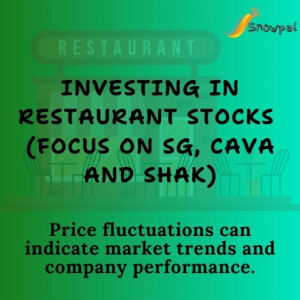
Wednesday Feb 19, 2025
Investing in Restaurant Stocks (focus on SG, CAVA and SHAK)
Wednesday Feb 19, 2025
Wednesday Feb 19, 2025
In this episode, Krish Palaniappan discusses the dynamics of investing in the food industry, focusing on three specific companies: Shake Shack, Cava, and SweetGreen. He provides insights into their recent stock performance, the factors influencing price fluctuations, and the importance of understanding the market landscape. He emphasizes the risks associated with trading and the value of personal experience in making investment decisions.
Takeaways
Shake Shack, Cava, and Sweetgreen are discussed as food industry securities.
Price fluctuations can indicate market trends and company performance.
Understanding the food industry is crucial for investors.
Different investors have varying approaches to stock selection.
Personal experience with companies can inform investment decisions.
Market trends can impact multiple companies in the same industry.
The importance of analyzing a company’s growth potential and competition.
Chapters
00:00 Introduction to the Podcast and Disclaimer02:54 Exploring Food Industry Securities05:52 Analyzing Price Fluctuations in Food Stocks09:14 Investor Perspectives on Food Companies12:06 Conclusion and Course Offerings







